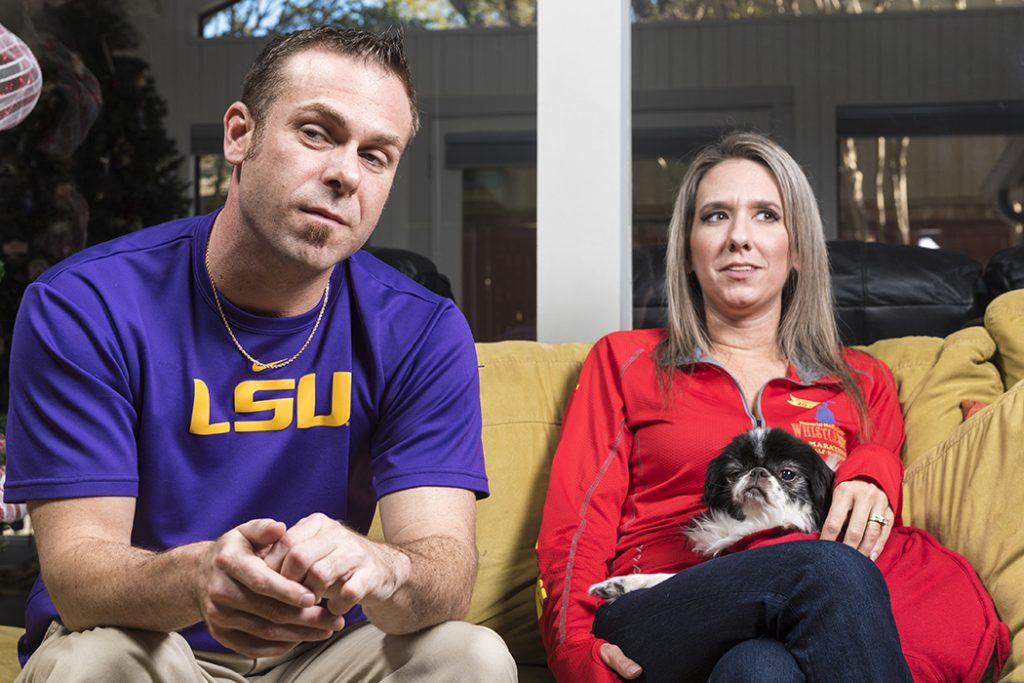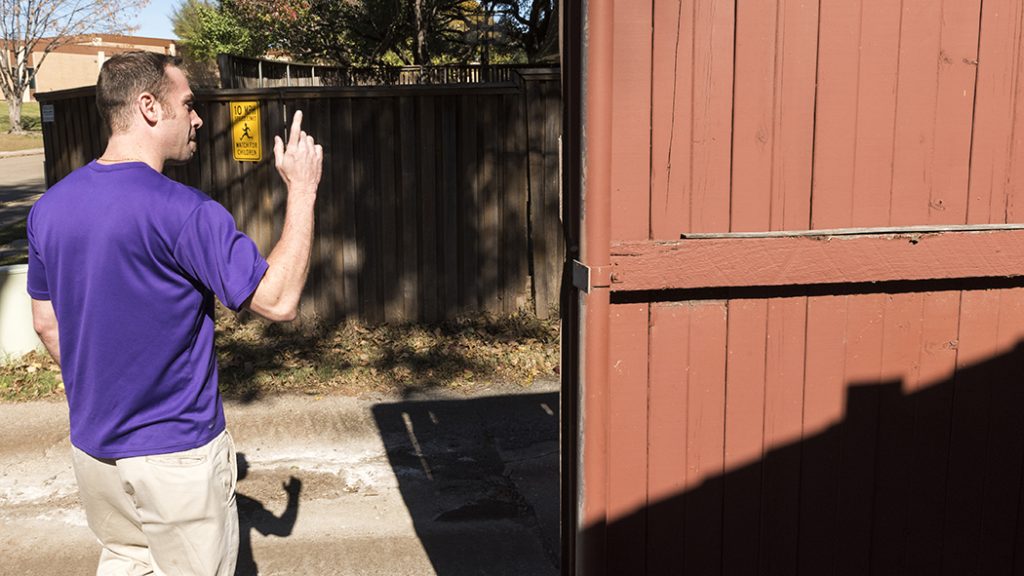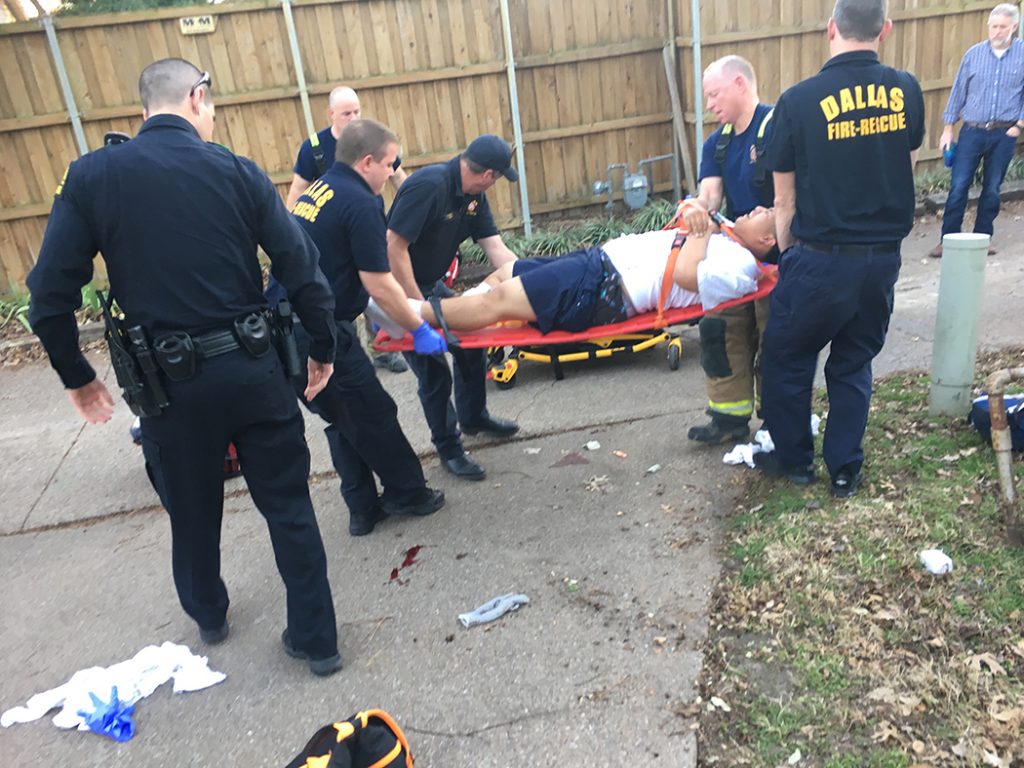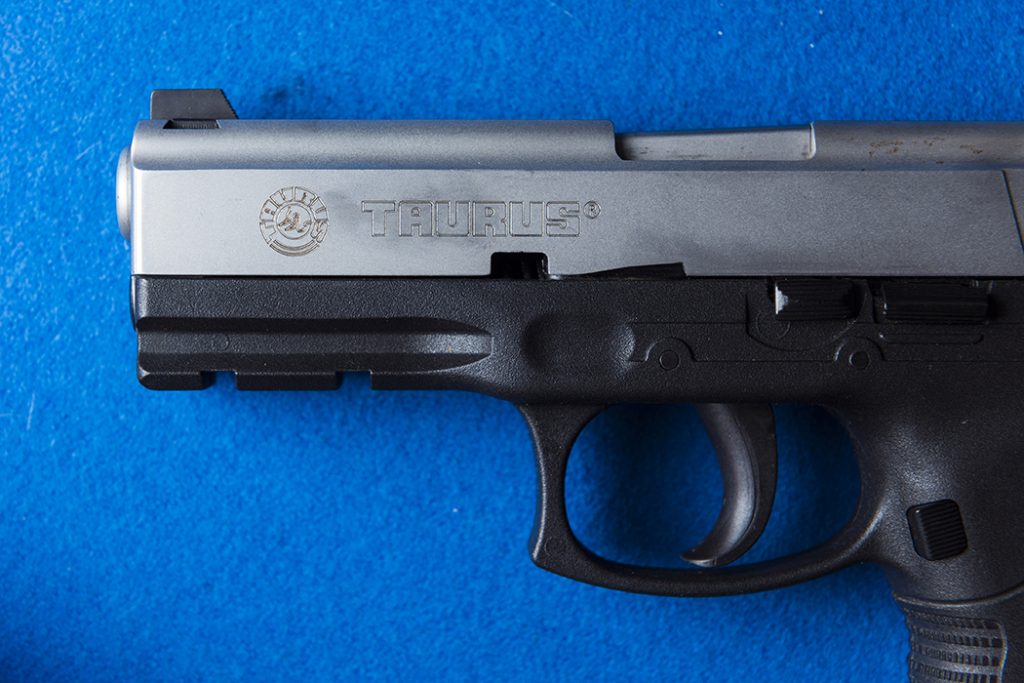
Andre and Julie Lanaux’s lives were changed after a home invasion shooting. (Photo by Danny Fulgencio)
Under fire
Just before sunset on a weekday in early 2017, several shots ring out in the affluent North Lake Highlands neighborhood.
A homeowner is chasing and firing at two fleeing intruders. He hits one; the other gets away.
A year later, both the injured perpetrator and the shooter are hurting in different ways.
Gun ownership in America — a right granted under certain conditions by our United States Constitution’s Second Amendment — is an increasingly politicized issue, but in Texas, conservatives, liberals and independents — more than a million of us — have handgun licenses.
Possessing a gun for protection of person and property is relatively commonplace around here. Actually using the weapon for such purposes is less so.
When is shooting justified? What is it like, as a civilian, to shoot someone? What happens after you pull the trigger?
Andre and Julie Lanaux purchased their dream house in autumn 2016, a goal for which the pair had worked vigorously. They delighted at the opportunity to entertain friends in the spacious, contemporary abode nestled in the desirable North Lake Highlands neighborhood, known for mature trees, rolling hills, proximity to parks and the neighborhood high school, not to mention its relative security.
The fun-loving couple bought a pool table and kept the fridge stocked with beer for guests.
“We just love the neighborhood, and our neighbors, and we felt safe and really happy and excited,” says Julie.
They began to settle in, and 36-year-old Andre started hitting the nearby health club after work. But on Jan. 31, 2017, he wasn’t up to it. He arrived home an hour earlier than usual. Before pulling into the garage, he noticed something amiss.
“The door was cracked open,” he says.
He walked to the front and, through a window, momentarily met eyes with a man inside his living room. Peripherally, he spotted movement in the backyard — another intruder stood behind the fence, near the pool.
Powered by adrenaline, Andre bolted — not away from the scene but back to his car. He retrieved his 40-calibur Taurus pistol and entered his home, prepared for a shootout. He thought they might be armed, he says, or maybe they found the rifle he kept upstairs.
Andre and Julie had three firearms. They carry handguns in their respective vehicles’ glove compartments. They attained licenses following a frightening “road rage incident,” Andre says. After an enraged driver tried to run them off the highway, they feared for their lives, but police responded to their report with nonchalance, they say.
“So I wanted to take matters into my own hands in the future,” Andre says. They keep the third firearm in the home, a .22 rifle with both sentimental and practical value.
“My grandfather learned to shoot with it, taught me and then passed it on,” Andre says.
The two burglars were running out the back door, toward the alley, carrying multiple backpacks, when Andre began firing.
Overwhelmed, he chased and shot. In those seconds, he thought “stop them, shoot low” rather than “kill,” although he concedes he was unable to take adequate aim, because all involved were in frenzied motion.
“One of the guys looked back. I saw his face. I probably could have hit him in the face,” Andre recalls.
But, it was the other one who dropped to the ground, wailing, hit by a hollow-point bullet in the calf muscle.
His accomplice seemed to stall for a moment, as if he was going to come back, Andre says. Then he ran, and to this day has not been identified.

Andre Lanaux shows where he chased the teenage intruder into the alley. (Danny Fulgencio)
“I was freaking out. I was afraid I might be in trouble, go to jail,” Andre says.
The 911 operator told Andre to put the gun aside, away from his person, where investigators could retrieve it themselves.
“So that the police wouldn’t shoot me,” Andre explains.
Paramedics and police arrived quickly (the Northeast Division substation is less than a mile away). Neighbors emerged.
A woman from across the alley chastised Andre.
“There are kids out here,” she hollered, and he could have hit an innocent person. Dazed, he listened; her tirade did not fall on deaf ears. He still thinks about her words when he cannot sleep.
An ambulance carried away the injured suspect, who soon was identified as Julio Rivera, age 16.
Because he is a juvenile, none of Rivera’s records are publicly available.
Julie was still at her downtown office when Andre called.
“I need you to come home. I shot somebody. They broke into our house.”
It had been a crazy day at the office, and it was a 20-minute drive home, Julie recalls. As darkness descended, she arrived to a chaotic scene — police everywhere, neighbors gathered outside.
She found her husband, rushed to him, gave him a big hug and said, “I am glad you are OK.”
The investigators asked the homeowners to look at the items in the house and driveway.
“We had to identify our own property and what wasn’t ours, like a couple of the backpacks. And a cellphone,” Julie says, pausing to look at her husband, perhaps to see how he was holding up as she recounted this part.
As they took inventory, a cellphone, lying on the ground, which evidently belonged to Rivera, rang repeatedly.
“ ‘Dad, Dad, Dad’ kept showing on the screen — it must have rang 20 times,” Julie says. Heartsickness washed over them as they realized the boy’s father was desperately trying to reach his son.
By then, Julie, a lawyer, had spoken to friends at the police department and partners in her office. She believed Andre was within his rights, under Texas law, to shoot.
“It didn’t change the fact that we were now the people who had shot someone’s child,” she says.
“If it was an adult, I would feel less bad,” Andre says. Rivera is a large teen. He appears older than his years.

A neighbor’s snapshot of intruder Julio Rivera receiving medical treatment after being shot by Andre Lanaux, who caught the teen in his home. (Photos courtesy of Julie Lanaux)
In future proceedings, Andre would not even be able to look at the kid’s parents, he says.
Officers temporarily confiscated the gun. Andre sat in a police car and answered their questions.
“They didn’t treat me like a criminal or anything. They were professional and calm. They were following protocol,” Andre says.
They advised Andre to purchase another gun, because they would likely keep his for several months. He did.
Last November, after the investigation concluded, they returned the handgun, wrapped in a paper bag, to Andre.
Texas law allows homeowners to protect themselves and their property, even with deadly force.
Chapter 9 of the penal code describes all kinds of self-defense and personal property protection laws, says Ted Steinke, a criminal defense attorney and former prosecutor for more than 42 years who also happens to live in Lake Highlands North, where he chairs the crime watch. The law says that a property owner is justified in using force if the owner believes it is necessary to prevent someone from interfering with said property. Essentially, Steinke says, there is tremendous room for discretion in Texas law.
“In layman’s terms, a person has the right to use force to protect property up until law enforcement says it was not reasonable.”
In some cases a homeowner could be arrested and a grand jury would decide whether to indict. Action is determined on a case-by-case basis.
If someone in Andre’s situation accidentally shot a bystander, he or she would face criminal liability, Steinke says.
Shooting an intruder inside the home (your car and workplace also fall under this code, often called Castle Doctrine), where homeowners are clearly protected under the law, is different than shooting someone who has already left the premises. And there is a difference between killing and wounding.
“If a fleeing intruder is killed rather than injured, things are going to be different,” Steinke says.
Every state varies, and Texas is more lenient when it comes to protecting property and carrying a gun.
The investigators spent five hours or so at the Lanaux residence that night, searching the home, questioning the couple and dusting for fingerprints and other evidence.
Andre was not charged with any wrongdoing. Andre and Julie also recently were awarded $5,000 in restitution for damages and losses.
Ultimately, losses included an array of strangely miscellaneous items, not entirely important ones, all things considered, Julie says. “They stole jewelry that was mostly costume jewels, every lighter we owned, all of our beer, condoms, my medal from the Dallas Marathon,” she says. “They obviously played a game of darts, played pool and spilled beer all over the expensive pool table covering.”
The Lanauxs still believe in protecting themselves with guns, especially following the break-in. Julie went into work late the day of the shooting, they recall. What if she had been there alone with no way to defend herself, they ask rhetorically. They aren’t going to take that chance.
But the incident served as a wake-up call.

The actual handgun used in the incident. (Photo by Danny Fulgencio)
Since the suspect is a minor, we were unable to interview him. However, Julie says that at the restitution hearing, his mother cried and pleaded for leniency, saying her son still could not walk or secure a job. The family was given five years to pay the $5,000.
Andre has heard endless judgments from friends and family, he says, ranging from “you should have killed him” and praise for his gunslinger action to appall for almost killing a teenager over property or even (from his own parents) owning guns at all.
Andre went along with jokes made on social media and took the virtual high fives from gun enthusiasts in stride, but behind closed doors, he was agonizing.
The funny thing is, Julie says, they are both politically left-leaning, the only ones in their Carrolton neighborhood, before moving here, to place a Hillary Clinton support sign in their yard.
In Texas, yes, even self-proclaimed “bleeding-heart liberals” might be packing heat.
He is thankful no lives were lost, Andre says, but he and Julie both have endured sleepless nights.
Andre seemed to suffer signs of post-traumatic stress, Julie says, such as waking up in the middle of the night, yelling. “Night terrors,” she says, “where it would take 30 minutes or more to calm him.”
He stopped going to parties and social events. Stopped meeting up with the running club to which he and Julie belong. He couldn’t sleep well for three months at first, she adds.
And a few months ago, when Andre heard about another homeowner in the nearby Moss Haven area who shot an intruder, he contacted the guy, because he thought the person might be suffering in a similar way, and he wanted to know if he could help, Julie says.
That’s one of the tough things about our right to own guns, says lawyer Ted Steinke. It’s something trained police officers deal with all the time. Steinke has defended several Dallas cops indicted because their supervisors determined they made the wrong decision with a firearm. For citizens, it is even tougher. “You sometimes have to make a split-second decision,” he says, “and it can change your life.”





